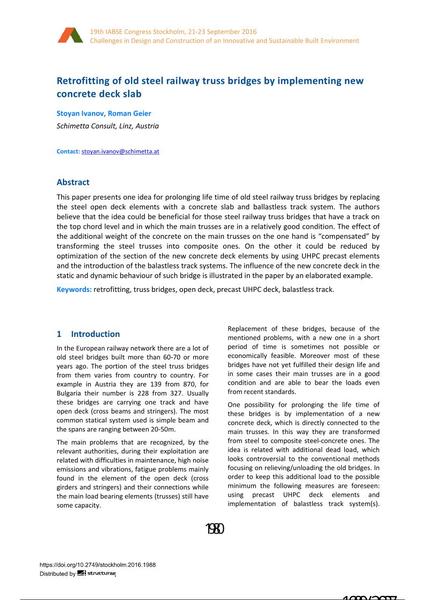Retrofitting of old steel railway truss bridges by implementing new concrete deck slab

|
|
|||||||||||
Détails bibliographiques
| Auteur(s): |
Stoyan Ivanov
(Schimetta Consult, Linz, Austria)
Roman Geier (Schimetta Consult, Linz, Austria) |
||||
|---|---|---|---|---|---|
| Médium: | papier de conférence | ||||
| Langue(s): | anglais | ||||
| Conférence: | IABSE Congress: Challenges in Design and Construction of an Innovative and Sustainable Built Environment, Stockholm, Sweden, 21-23 September 2016 | ||||
| Publié dans: | IABSE Congress Stockholm, 2016 | ||||
|
|||||
| Page(s): | 1980-1987 | ||||
| Nombre total de pages (du PDF): | 8 | ||||
| Année: | 2016 | ||||
| DOI: | 10.2749/stockholm.2016.1988 | ||||
| Abstrait: |
This paper presents one idea for prolonging life time of old steel railway truss bridges by replacing the steel open deck elements with a concrete slab and ballastless track system. The authors believe that the idea could be beneficial for those steel railway truss bridges that have a track on the top chord level and in which the main trusses are in a relatively good condition. The effect of the additional weight of the concrete on the main trusses on the one hand is “compensated” by transforming the steel trusses into composite ones. On the other it could be reduced by optimization of the section of the new concrete deck elements by using UHPC precast elements and the introduction of the balastless track systems. The influence of the new concrete deck in the static and dynamic behaviour of such bridge is illustrated in the paper by an elaborated example. |
||||
| Mots-clé: |
ponts en poutre en trellis
|
||||


